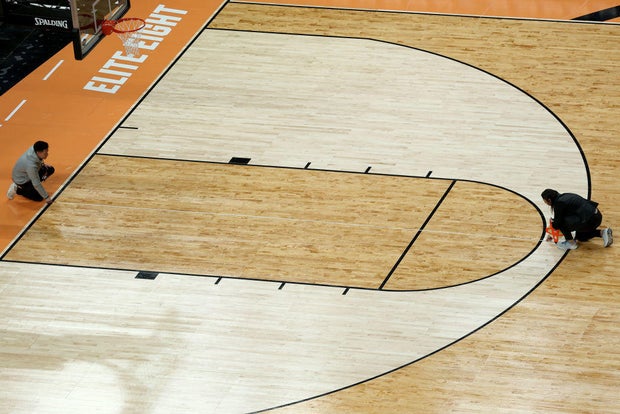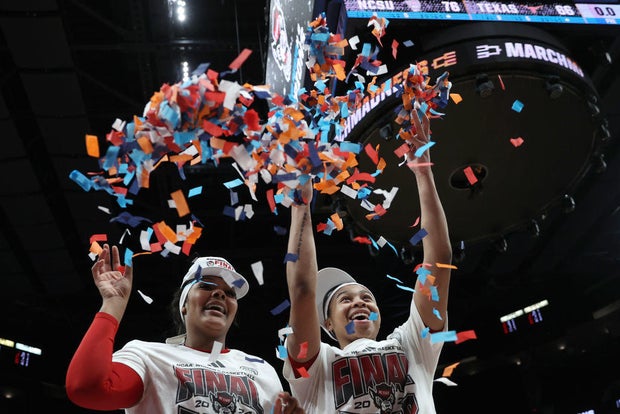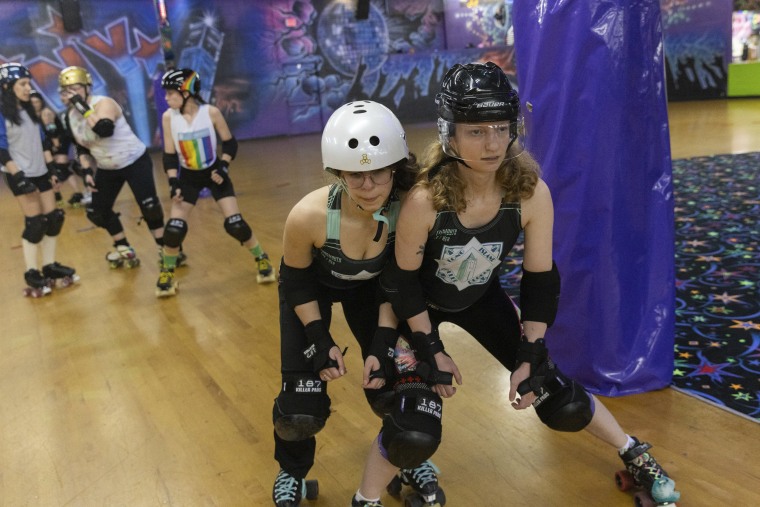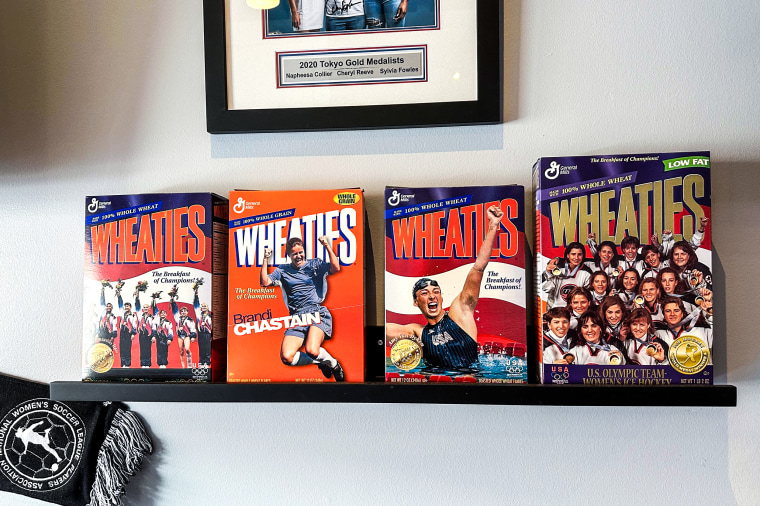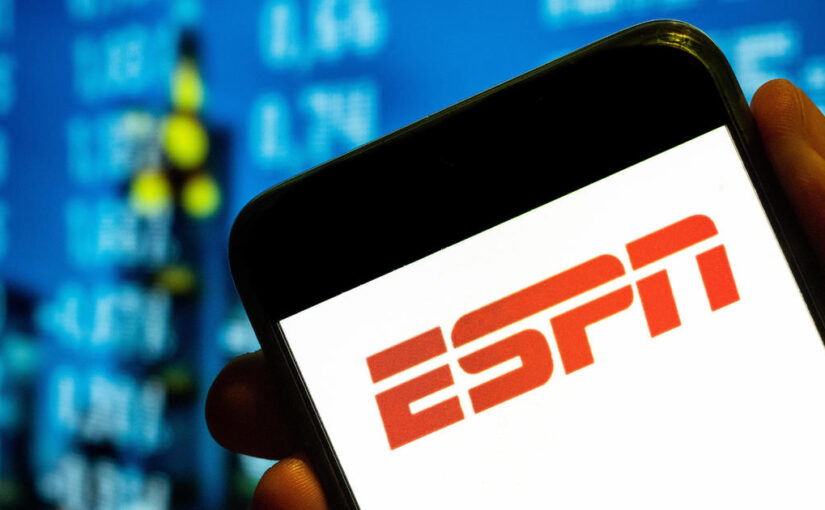The 3-point line for the NCAA women’s basketball tournament at Moda Center had a discrepancy in distance at each end of the court that went unnoticed through four games over two days before Texas and North Carolina State were informed of the problem ahead of their Elite Eight matchup on Sunday.
The teams’ coaches agreed to play Sunday’s game as scheduled with the mismatched 3-point lines rather than delay it, the NCAA said in a statement. N.C. State beat Texas 76-66 to advance to the Final Four.
“The NCAA was notified (Sunday) that the 3-point lines on the court at Moda Center in Portland are not the same distance. The NCAA staff and women’s basketball committee members on site consulted with the two head coaches who were made aware of the discrepancy. All parties elected to play a complete game on the court as is, rather than correcting the court and delaying the game,” Lynn Holzman, the NCAA’s vice president of women’s basketball, said in a statement.
Holzman said all lines would be measured after practices concluded on Sunday evening and the correct markings would be on the floor ahead of Monday’s game between Southern California and UConn.
“While the NCAA’s vendor has apologized for the error, we will investigate how this happened in the first place. The NCAA is working now to ensure the accuracy of all court markings for future games,” Holzman said. “We are not aware of any other issues at any of the prior sites for men’s or women’s tournament games.”
Connor Sports makes the March Madness floors for both men and women.
Steph Chambers/Getty Images
“We apologize for the error that was found and have technicians on site at the Moda Center in Portland who were instructed to make the necessary corrections immediately following (Sunday’s) game,” the company said in a statement.
The court issue was another distraction for the NCAA during a women’s tournament in which the play has been exceptional but other issues have taken the spotlight.
There was a referee pulled out of a game at halftime in the first round. Utah faced racist harassment before its first-round game. Notre Dame’s Hannah Hidalgo was forced to remove a nose ring and missed time in a Sweet 16 loss to Oregon State. LSU coach Kim Mulkey threatened to sue The Washington Post over a then-unpublished profile of her and later called out a Los Angeles Times columnist for what she said was sexist criticism of her team. The Times edited the column in response.
And now, the court issue in Portland.
“I hate to say this, but I have a lot of colleagues that would say, ‘Only in women’s basketball,'” Texas coach Vic Schaefer said. “I mean, it’s a shame, really, that it even happened. But it is what it is.”
Four Sweet 16 games on Friday and Saturday were played without any of the participating teams saying anything publicly about a problem with the court.
During pregame warmups, Schaefer and N.C. State coach Wes Moore were informed that the 3-point line distance at the top of the key was different on both ends of the floor. The distance between the top of the key and the 3-point line was too short at the end in front of the N.C. State bench, while the line at the Texas end was correct, Moore said.
NCAA officials were asked to measure the distance and brought out a tape measure about 15 minutes before tip-off. After discussions between NCAA representatives, the coaches and officials, the game went on as scheduled.
A delay would have taken at least an hour, both coaches said, because someone from the outside would have to be brought in to remark the floor and could have forced the game to be bumped from being broadcast on ABC.
“That’s a big deal to be on ABC,” Moore said. “We’ve been fortunate to be on it a couple of times the last couple of years. But it’s a big deal.”
Steph Chambers/Getty Images
Both coaches said their players were not aware of the discrepancy, and N.C. State’s Aziaha James in particular had no trouble, making a career-high seven 3s on nine attempts. The NCAA said the court would be corrected before Monday’s Elite Eight matchup between Southern California and UConn.
“At the end of the day we had already played a game on it and we both won, so we just decided to play,” Schaefer said.
While the NCAA did not provide details, one 3-point line near the top of the key appeared to be about 6 inches closer to the basket than at the opposite end of the floor. The NCAA 3-point line is at 22 feet, 1 3/4 inches for both women and men.
The numbers showed that players struggled with the line that was too close to the basket.
Through five games, teams shooting on the end with the closer 3-point arc were 25.8% (23 of 89) on 3s. At the end of the floor that was correct, teams shot 33.3% (29 of 87).
“These kids, they shoot so far behind it sometimes nowadays, who knows where the line is?” Moore said. “It is an unusual situation. But, like I said, I don’t know that it was an advantage or disadvantage, either way.”
Baylor coach Nicki Collen, whose team lost to USC in the Sweet 16, posted on social media that with eight teams at one site, the focus was on game plan, not what the court looked like.
Baylor was 6 of 14 on 3-pointers in the second half while shooting at the end of the floor with the correct arc.
“Guess that’s why we shot it better in the second half,” Collen posted.
